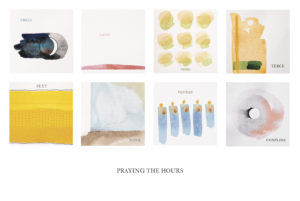The first and the last words you will hear in the film Praying the Hours are sung by a Greek Chorus—all of whom are played by one woman: Lolo Meares. The chorus helps the audience transition from one Hour to the next, urging them to pay attention. This is the purpose of praying the Hours, really, the core purpose, to stop and recognize the presence of God. They start the film with the call to listen, and end it with the call to have mercy.
The functions of a traditional Greek Chorus are both elaborate and pragmatic. They are meant to give a sense of spectacle, to drop hints that the common stories you are watching are more than meet the eye and ear, that layers go deep in order to bear the weight of reflection. Much might be missed if you’re not careful, they warn. They are also there to alert you to the changing of the Hour, like chapter breaks, much as Greek Choruses once entertained audiences while sets were changed in new plays by Wm. Shakespeare.
The soundtrack for the film was written, performed, and sung by composer Lolo Meares (Lauren Meares). In her hauntingly beautiful score, her voice repeated becomes a choir coaxing viewers to listen, to wake, to choose, to sing, to see, to trust, to have mercy. In one song, the chorus ponders:
Where does love go when it’s gone?
Does it start all over, back to square one?
And how does it know when to stay or to go?
Where does love go, when it’s gone?
Where does love come from when it’s just begun?
Is it small like a seed or is it big as the sun?
And how does it know when to grow and grow?
Where does love come from?
A friend emailed his thoughts after watching the film, and in one glowing paragraph sang the praises of this new talent. Starting by saying that he was a public radio programmer in his first career and a concert promoter in his second, any new music “had to speak to me on a deep level,” he claimed. It did. In addition, he said, it was the perfect bridge between the Hours themselves, anchoring the film’s structure. Lauren’s arrangement of Scotsman George Matheson’s classic “O Love That Will Not Let Me Go” (1882) has changed forever the way I hear, and sing, that hymn. It accompanies the Vespers dinner shared by the film’s characters as they gather together as night falls. They gather, in classic Vespers style, to remind each other by the lighting of candles and small gestures of kindness how important it is to dwell in unity and to believe, together, that the light will return.
The music carried me through some dark times, I’m going to be honest. Much turmoil was going on in my life outside of the joy of working on Praying the Hours with Editor Patrick O’Neil Duff. My unpeaceful life was supported quietly by cue after cue that Lauren sent me as she wrote. I added all of those rough cues to a playlist that I listened to on repeat for months—at first to acclimate myself so I could use them articulately. It wasn’t long, however, that I was listening for my own need to be reminded to wake and to trust and to show mercy. She said the same happened with her as she wrote—that’s how we knew we had tapped into something deeper than ourselves, older, and more mysterious. She understood what the Hours were about, and we were so in sync that there was hardly a change requested of her apart from cuts made to match edits.
Lauren and I met years ago when, now and again, we would talk about her music and the turbulent doing (or not doing) of it. Once her husband, Matthew, pulled me aside as I was walking down the street where he attended classes at the graduate school where I worked. He told me, you have no idea how good she is, he said, speaking from the vantage point of their family of musicians. “She’s the best of all of us,” he said. I knew very early on that she was the one for this project, and when, some years later, I asked her to visit me at the beach where I was on vacation, she knew what I was going to invite her to do. She knew and she was ready and she was overwhelmed and she was terrified. I left her and Matt there for a few days and drove home so she would have time to think it over in a context that matched the grandeur of the challenge. When she returned, she said yes, and we dove in together.
Over the years since that day, she wrote two hours of music in her spare time. TWO HOURS. Somewhere about halfway into the process of this, her first soundtrack, I predicted, “people are going to want this soundtrack.” The music belongs to her and I’ve urged her to make it available on some streamable or downloadable source. I plan to promote it. Here’s what to expect: for the following eight weeks I’m going to write a little about each Hour as Lauren makes each album available. (For a taste now, you can listen to the opening cry of oyez by the Greek Chorus below).
Lauren and artist Lori Fox teamed up so that Lori’s artwork could be incorporated as the covers for each of the Hour albums (I wrote about that here). The next two months are partly making good on my desire to promote their very deserving work, but really the favor is to you, gentle reader. This soundtrack is a thing of beauty, and I listen to it still. I’m listening to it now.
*This Just In: Thank you Mary Ellen and Joanne for your lovely gifts in the last few weeks. I continue to be given courage by the women who have—in some cases sight unseen—supported the release of this project. That encouragement lives beyond even your generous gifts. Thank you. (If you want to see the film or receive updates, write to info@burningheartproductions.com. To contribute to its release, go here.)


